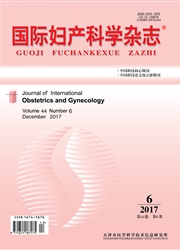

 中文摘要:
中文摘要:
卵巢癌是死亡率最高的妇科恶性肿瘤,由于缺乏特异性标志物,早期诊断存在很大困难。外泌体是近年多种领域的研究热点,其分布广泛,内容丰富,功能多变,越来越多地进入肿瘤研究领域。外泌体可来源于多种细胞和体液,通过运载多种蛋白、脂质、mRNA及miRNA片段等生物学功能物质,介导细胞-细胞间信息交流,促进肿瘤的发生、发展。此外,由于肿瘤相关外泌体可表达特异性抗原,这为肿瘤的诊断与治疗提供了新思路。就外泌体在卵巢癌发生、发展、诊断和治疗中的研究进行综述,以期更确切、更全面揭示外泌体在卵巢癌中的作用机制,为新的治疗方法提供理论基础。
 英文摘要:
英文摘要:
Ovarian cancer is the highest mortality rate of malignant tumor in gynecologic cancer. Due to the lack of specific markers, the early diagnosis of ovarian cancer is very difficult. In recent years, the exosome has become a hot research topic in many fields,as for its wide distribution,rich content and functional diversity, more and more studies into the field of cancer research. Exosomes can be derived from many kinds of cells and body fluid. They can mediate cell- cell information exchange, promote the occurrence and development of tumors through the delivery of a variety of proteins, lipids, mRNA and miRNA fragments and other biological functions. In addition, due to the specific antigen expression of tumor related exosomes, it provide a new idea for the diagnosis and treatment of tumors. This article reviews researches on the diagnosis and treatment of exosomes in the development and occurrence of ovarian cancer, the mechanism is more precise and more comprehensive in order to reveal the exosomes in ovarian cancer, and provide a theoretical basis for the new treatment methods.
 同期刊论文项目
同期刊论文项目
 同项目期刊论文
同项目期刊论文
 期刊信息
期刊信息
